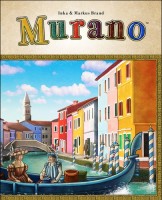
Murano
Murano seeks the most glorious of merchants. There is a lot going on in the Venetian lagoon: glassblowers are creating breathtakingly beautiful pieces of art, which are sold to discerning customers by the businessmen of various shops.
Various and esteemed personalities visit the small islands of
Murano in search of treasures to acquire. If your work lives up to their high standards, fame and glory shall be yours and you shall achieve victory in this game.Murano is an exciting mix of different game mechanics and challenging from beginning to end. The game board changes from turn to turn and every move counts.
Only at the end of the game, will you find out who has spent his resources best, built most skillfully, and placed his gondoliers most profitably!
New Buildings must always be placed adjacently to streets - the trick is buildings may be neutral or belong to a player, making profit from all the many customers in the alleys.
On your turn move a ship to the next free spot and play the corresponding action. Murano's simple worker placement mechanic involves a lot of decisions, with each movement changing the options for everyone!
The building cards provide many special benefits that allow for a broad range of strategies every time you play.User Reviews (2)
Add a Review for "Murano"
You must be logged in to add a review.


How to play
You are a glass art merchant and, on a board showing Murano and the other small islands around it, you must move from 1 to 8 gondolas, common pool available for all players, along the border to do actions. The actions available are: get money from bank, build buildings or roads, get character cards, use gondoliers, produce glass or sell it to gain money.
The twist is that each field has only action available and you cannot move the last gondolas over the others or beneath them, but you must move the other gondolas to send one in the field desired; of course, a part from the first gondolas moved, you must pay for moving the other ones.
If some actions give you money other ones give you points, you can also get extra points from character cards, that are activated by gondoliers and assigned to individual islands. The merchant with the highest points score wins the game.
Rules and Rulebook
Rules are well explained and written; it’s a very short rulebook, but take care that the last three pages are the Character Card Index; even if the text on the card is quite understandable, it could be necessary to look at the index.
How it works
The roundel moving common pool worker placement mechanism is somehow fresh: choose your own actions and at the same time have the other players in view. It’s also fluid because each turn consists only of activating one action; one the other side, in the first plays, it is possible to spend time to decide where and when place buildings: only experience will help to make the better decision.
The interaction is indirect, there is no action or card that let you block other players, and, it is good because there are enough frustration factors during the game. The bar of the game raise from family to gamers especially in the production of glass that costs victory points, a move that requires a little bit of calculation.
The judgement
Even if it is a medium light game, still the game experience is pleasant; the roundel mechanism is not easy to master but it is challenging and interesting. Be careful if the game experience of the players is different, newbies can lose with no chance to compete.
Taking place in the beautiful city of Venice, you are a glassblower by trade and are trying to make it big in the local industry. Attract customers to your shops, construct glassblowing factories, ride gondolas around the islands, build beautiful palaces, pave cobblestone streets; you do it all in this game! Choose one or a combination of several strategies to gain the most power, prestige, and wealth as a Venetian glassblower.
Murano has three components which I love: 1. the clever mechanics of selecting an action each turn, 2. the “mission” cards, and 3. messing each other up! 1 – The islands are surrounded by water spaces with several gondolas. To select a desired action, you move a gondola to an open space between that gondola and the one in front of it. You can image this can create a backlog of gondolas for particularly desirable spaces. To account for this, you may pay one coin to move an “extra” gondola around the river. This is a very fun component of the game. 2 & 3 – No one knows who has which missions to accomplish, so there is not really any malicious thwarting, but don’t mind the curse and fist-slam after you take a seemingly innocuous action that completely messed up your opponent!
This game has particular appeal to me because I lived in Italy for two years and speak the language fluently. As we played Murano, I could clearly picture local and tourist shoppers strolling down the narrow cobblestone streets perusing products left and right. I could hear the yelling of the salesmen and women in dialect Italian as they tried to capture your attention and pique your interest in their products. The smells, sights, and sounds were so familiar to me. Murano gets an extra point for so thoroughly pulling me into the vibrant Italian village scene.
We’ve played this over a dozen times recently, and I could keep playing it. Replay value is very high because of the different yet interrelated paths to victory. Overall, I give Murano a very high 8.5 for its clever gameplay, its balance between planning and needing to roll with the punches, and its beautiful artwork and scenery.
Bonus tip: I find that pushing shops heavily in the very beginning sets you up with a solid income to where you may be the only player not scrambling for a revenue stream in the middle of the game. This will make more sense to you as you play.